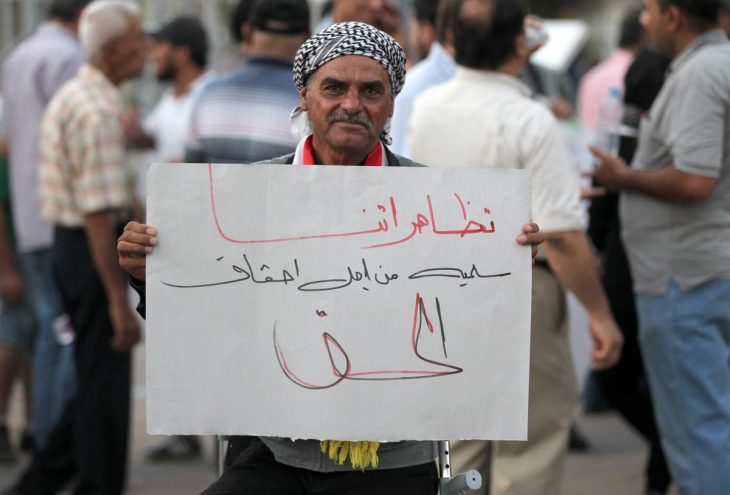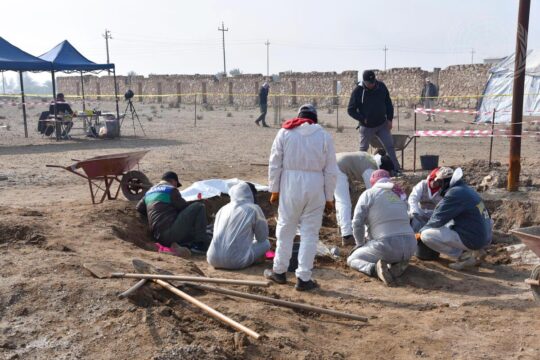JUSTICEINFO.NET: What’s the purpose of the U.N. project on reconciliation in Iraq?
FANIE DU TOIT: We are supporting the government of Iraq and also civil society to get citizens to be involved in peace-building in their communities, and to provide feedback to the government as to what the community thinks the priorities ought to be in terms of tensions that are arising around issues such as the return of IDPs [internally displaced persons] to their communities, restoration of properties that were destroyed by ISIS [Islamic State in Iraq and Syria], and deep tensions between sectarian, ethnic, religious groups that have historically existed.
Could you give an example of mistakes made during the implementation of previous projects?
Previous efforts in Iraq were almost exclusively top down, politically driven. They did not consult ordinary Iraqis in the execution, implementation, and therefore they were met with scepticism on the ground and were short on impact. This is why the project is called Integrated Reconciliation. It is a bottom-up approach trying to activate citizens on the ground on what should happen and what they can do. Local peace committees, leading members in communities sit together with the mayor and some of the tribal leaders and the security establishment to try and figure out what needs to be done in a specific context.
What are the main concerns that members of the community have voiced?
Whereas previous attempts of reconciliation have been quite punitive and perpetrators-focused, communities have been asking: “What about the victims?”
One of the main concerns is the plight of victims. Iraq has been in perpetual war since 1979, so you can imagine the multiple layers of victimisation. Everyone has suffered in terrible ways. Whereas previous attempts of reconciliation have been quite punitive and perpetrators-focused, communities have been asking: “What about the victims?”.
The Yazidi community speaks about fifty mass graves in their areas, and they say that there are still hundreds of girls missing; they were abducted into sexual slavery. They demand some form of real justice that they can see and that has an impact, before they say that they’ll be able to trust anybody again.
Secondly, they would like to see effective governance and service delivery in their areas. This is not unique to Iraq, but is something that’s particularly hurtful because people know that there is money in the system. Iraq is not a desperately poor country, they have money from oil revenues, but very little of this money makes its way down. This is a very burning issue; how can corruption be cured?
Thirdly, communities are fed up with external influences and proxy wars, they want to govern themselves and they want politicians to be genuinely representative of people of Iraq.
What are the challenges of promoting reconciliation in such a context?
The complexity is a challenge. If you look at a given community in Iraq, there are several conflicts happening at the same time, all happening in the same space. One has to be extremely careful before imposing a simple solution on the communities. Communities themselves best understand the conflict lines. One of the things that we are trying to achieve is to bring communities on the same page as to what are the effects of conflict lines in their communities. If they agree on this, then there is a possibility of a mutual solution. As long as people analyse the conflict differently, they can’t agree on the way forward.
ISIS ideology is still in place, although the group has been militarily defeated for now. Has this hindered efforts to achieve reconciliation?
Absolutely. But at the same time, what one sees now is that what ordinary Iraqis have said is: “We have seen the devil, we have looked at it in the eyes and we have no desire to go back there.”
I do not think that extremist ideas necessarily are a youth thing either. I don’t see youths being the main ISIS supporters in Iraq.
Religious extremism is really discredited amongst most Iraqis now. And what’s very interesting for me is that I do not think that extremist ideas necessarily are a youth thing either. The popular notion is that because youths are unemployed and are not socially included, they are susceptible to this ISIS ideology. There may be some truth, but I don’t see youths being the main ISIS supporters in Iraq. Older ideologues carry this ideology and have a social media platform and they make promises to youths and then youths may get involved. [But youths of Iraq] don’t need much convincing in terms of rejection of extremism.
In the Christian town of Bartela, when ISIS arrived, the Christians fled and a church was attacked. Some of the Muslim members of the community decided to repair the cross on top of the church. It was their way of saying to the Christian community: “Please come back, we want you back.” This is what we want to promote.
Fanie du Toit: Iraqi victims are not prepared to reconcile without justice
In this video clip, Fanie du Toit explains the need of a victims-centered strategy in Iraq, notably in the aftermath of the defeat of ISIS.
Why are community-based programmes essential to achieve reconciliation?
Credibility of reconciliation crucially depends on it. If people are not included in the decision-making, their agency is not restored and people don’t buy into it and don’t support it. Iraqis are cynical about reconciliation at the moment, because they see it as being manipulated by the leadership.
For example, the Iraqi judicial system already depends on collaboration with tribal leaders, religious leaders, academics, women’s rights activists and people like that, of which there is no shortage in Iraq. Peace should be therefore also inclusive rather than exclusive. Previous reconciliation attempts have often been politicised. That means serving one side or the other and for it to be genuine and inclusive you need the communities to be involved.
Your latest book “When political transitions work” has a subtitle: Reconciliation as interdependence. What did you want to say?
If you look at reconciliation, you need to give it a certain content for it to become a guiding framework for countries moving from civil wars and oppression towards democracy, and I suggest interdependence as very productive in this scenario.
In South Africa, the real driving force of our reconciliation process was the idea that simply we are in this together, that we need one another, that we are interdependent.
I look at the South Africa’s transition 20 years on. It continues to be misunderstood, not only by foreign analysts but by South Africans themselves and I conclude that the real driving force of our reconciliation process – which to some degree worked because it ended political violence, it created democratic institutions and began a social change process (although not half as successful as we though it would be) - the idea that drove that was not necessarily forgiving one another, it was not necessarily liberal human rights, it was not necessarily agonistic debate, but it was the idea that simply we are in this together, that we need one another, that we are interdependent. That’s the idea that drove us to the degree that we’ve done.
We have lost our way somewhat in South Africa, not because we are not sufficiently committed to human rights, but because we have forgotten that white South Africans and rich South Africans are on the same boat as poor South Africans and black South Africans. And this idea has lots of potential in other parts of the world.
Such as?
In any society where two groups that are in conflict share the same territory and are in fact interdependent. Palestine and Israel for example. I think everything that has been done in terms of managing the conflict in Israel and Palestine is to deny this interdependence and try to assert the fact that Israel can do this on their own and they don’t need the Palestinians to flourish. That’s a fundamental denial, and it’s not realistic. Realism would say: “Unless the Palestinians flourish, the Israelis will not really be free and at peace.” I think this is absolutely true, and I think it’s what reconciliation would add to that context.
Can the reconciliation model applied in South Africa be replicated somewhere else?
I don’t think it’s a model at all. It’s our process, it’s something that we figured out as we were going. It was effective for us because it was not imposed on us. But the theory of interdependence that drove us is a very productive idea. And it would be very interesting if that idea would be allowed to guide leaders in other countries.
Interviewed by Ludovica Iaccino for JusticeInfo.net.
In this interview with JusticeInfo, Du Toit speaks in his personal capacity and his views and opinions do not necessarily reflect the official policy or position of the United Nations Development Programme.






